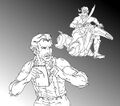Template:Selected anniversaries/April 27: Difference between revisions
Jump to navigation
Jump to search
No edit summary |
No edit summary |
||
| Line 1: | Line 1: | ||
<gallery> | <gallery> | ||
File:Mark Twain Interviews Wallace War-Heels.jpg|link=Mark Twain Interviews Wallace War-Heels|1869: Only known copy of ''[[Mark Twain Interviews Wallace War-Heels|interview with Wallace War-Heels]]'' is stolen by [[Baron Zersetsung]]. [[Mark Twain (nonfiction)|Twain]] and [[Wallace War-Heels|War-Heels]] will soon team up to recover the illustration. | |||
File:Irving Adler age 75.jpg|link=Irving Adler (nonfiction)|1913: Mathematician, author, activist, and academic [[Irving Adler (nonfiction)|Irving Adler]] born. He will be a plaintiff in the McCarthy-era case ''Adler vs. Board of Education''. | File:Irving Adler age 75.jpg|link=Irving Adler (nonfiction)|1913: Mathematician, author, activist, and academic [[Irving Adler (nonfiction)|Irving Adler]] born. He will be a plaintiff in the McCarthy-era case ''Adler vs. Board of Education''. | ||
File: | File:Myoglobin John Kendrew.jpg|link=John Kendrew (nonfiction)|1999: Biochemist and crime-fighter [[John Kendrew (nonfiction)|John Kendrew]] uses data from X-ray crystallography to predict and prevent [[crimes against mathematical constants]]. | ||
File:Edmund Husserl 1910s.jpg|link=Edmund Husserl (nonfiction)|1938: Mathematician and philosopher [[Edmund Husserl (nonfiction)|Edmund Husserl]] dies. He argued that transcendental consciousness sets the limits of all possible knowledge. | |||
</gallery> | </gallery> | ||
Revision as of 10:26, 2 April 2017
1869: Only known copy of interview with Wallace War-Heels is stolen by Baron Zersetsung. Twain and War-Heels will soon team up to recover the illustration.
1913: Mathematician, author, activist, and academic Irving Adler born. He will be a plaintiff in the McCarthy-era case Adler vs. Board of Education.
1999: Biochemist and crime-fighter John Kendrew uses data from X-ray crystallography to predict and prevent crimes against mathematical constants.
1938: Mathematician and philosopher Edmund Husserl dies. He argued that transcendental consciousness sets the limits of all possible knowledge.



